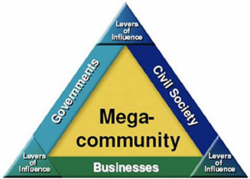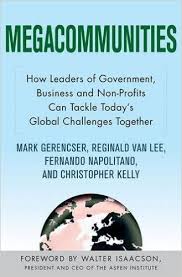“Leaders have a significant role in creating the state of mind that is the society….they can conceive and articulate goals that lift people out of their petty preoccupations, carry them above the conflicts that tear society apart, and unite them in pursuit of objectives worthy of their best efforts.”
~John Gardner
In their important book Megacommunities, four senior leaders from the international consulting firm Booz Allen Hamilton define megacommunities as those where leaders from the three major sectors of business, government, and civil society come together to forge new kinds of partnerships and have different kinds of conversations, designed to achieve what John Gardner describes as the outcome of true leadership.
 Megacommunity leaders have conversations that are constructive, collaborative, characterized by shared commitment to the common good, resulting in outcomes that optimize wellbeing for the good of the whole of society in an interdependent world. The authors say: “Across all three power sectors – business, the government, and civil society – fresh solutions are desperately needed.” Desperately needed because we live in “an interdependent world in crisis.” They go on to list as examples of a world in crisis climate change, aging infrastructure, terrorism, water scarcity, and the need for sustainable energy, among other things.
Megacommunity leaders have conversations that are constructive, collaborative, characterized by shared commitment to the common good, resulting in outcomes that optimize wellbeing for the good of the whole of society in an interdependent world. The authors say: “Across all three power sectors – business, the government, and civil society – fresh solutions are desperately needed.” Desperately needed because we live in “an interdependent world in crisis.” They go on to list as examples of a world in crisis climate change, aging infrastructure, terrorism, water scarcity, and the need for sustainable energy, among other things.
Speaking of interdependence and crisis, change agent Peter Senge notes a similar theme: the implications of our interdependence are skyrocketing as population growth and technology cause ever greater negative impacts on people and the planet, at an ever increasing rate. Global warming, financial crises, pandemics, economic disparities, water availability, regional conflicts, these are all conditions that, no matter where and how they start or how local or regional they are, impact everyone and everything in the world.
Senge points out that while the implications of our interdependence are skyrocketing, our understanding of interdependence is just starting to dawn on us. We still have a long way to go to appreciate how interdependent things really are. We are beginning to figure out that we need to think, talk, and act in different ways if we are to effectively tackle our many interconnected challenges.
To make matters worse, one of Senge’s colleagues observes that as implications of our interdependence continue to grow and our collective awareness of our interdependence is coming into focus, many leaders in times of crises hunker down even more deeply into known and familiar, but outmoded patterns of thinking, talking, and decision-making. For example, defining issues in narrow, simplistic terms when our challenges are large scale and unprecedented in complexity; using a limited and limiting win-lose approach rather than applying a generative and creative win-win mindset; blaming; demonizing; fear-mongering.
People clamor for quick, straightforward, simple answers in difficult times and respond to leaders who offer them, even though such answers are completely inadequate and perpetuate the problems of the status quo. To quote H.L. Mencken, “For every complex difficult problem there is an answer that is clear, simple, and wrong.” Again, from the authors: “…in order to achieve a megacommunity-level of performance, new capabilities and a new kind of leadership are imperative.”
And as Einstein said, “No problem can be solved from the same consciousness that created it. We have to learn to see the world anew.” We need leaders who can help us frame conversations in ways that ‘unite us in pursuit of objectives worthy of our best efforts.’
 What defines this type of leaders? What do they know how to do? In Chapter 6 of Megacommunities the authors identify “the fundamental elements of a top-flight megacommunity leader….”
What defines this type of leaders? What do they know how to do? In Chapter 6 of Megacommunities the authors identify “the fundamental elements of a top-flight megacommunity leader….”
- A Spirit of Inclusiveness: a living embodiment of an “us and them” strategy, not an “us versus them” strategy.
- Tri-Sector Exposure: embrace, not just accept, the challenge of working in a larger, more complex sphere of influence.
- A Non-Imperial Approach: the dominance of the imperial (leader) is over. Instead, “inclusive leaders” are on the rise and are willing to engage in dialogue….
- Navigation Skills (A Light Touch): stimulating the need to collaborate, inventing strategies that work for everybody, and keeping people motivated…. Leadership is about navigation – keeping sight of a distant target while dealing with the ebbs and flows of daily activity. The touch is lighter. It is a guiding touch, one that lets constituents self-discover.
- Communications Skills: The ability to speak, negotiate, and listen effectively… may be the most important single set of personal assets possessed by a megacommunity leader.
- Technological Savvy: Technological know-how clustered into three overarching categories:
- Tools: Apply information technology and other forms of communication in many ways.
- New Media: Be familiar with websites, wikis, written and video blogs, texting, and all types of multi-media programming
- Systems: Understanding systems thinking is essential and embraces a wide variety of interrelated wholes, from biological systems to computer systems to the systems of interrelated forces that produce the complex problem megacommunities are trying to solve. Behind every major problem is a system to be understood.
- Adaptability: Openness to influence is the hallmark of a good leader; intellectually curious; open-minded, adaptable; a continuous adopter (trying out new ideas in limited ways).
- The Talent to Foster Talent: Be a good team and talent builder, drawing out qualities and capabilities that people didn’t know they had until they begin to use them; a values-based leadership approach.
- Presence and Passion: A leader must have a strong, centered presence; authenticity; human-to-human resonance; self-assured but humble; generous as opposed to cynical; a heightened sense of empathy; most important, passion and conviction.
- Long-Term Thinking: Last but not least we come back to our favorite word…: sustainability. A megacommunity leader must be oriented toward the sustainable.
There are people who qualify as megacommunity leaders doing great things at every scale of community, and anyone can cultivate the capacities described here. Leadership expert Warren Bennis assures us that leaders are made, not born.
So pick up On Becoming a Leader by Warren Bennis, Servant Leadership by Robert K. Greenleaf, and Primal Leadership by Daniel Goleman, three of my favorites. They and other wise leadership guides offer open secrets that can build your capacity for true leadership and empower you to change the world.





Thank you Mike, for this thoughtful guide to transformational leadership – and for your embodiment of those virtues and abilities in your presentation at Alabama Environmental Council’s POWER-UP Forum at Birmingham-Southern College last week. From my perspective on the sidelines of our presidential nomination proceedings, I can observe the need for the spirit of inclusiveness and the other fundamental elements of a megacommunity leader you share here.
Well done, Mike! I enjoyed reading this and hope to utilize aspects of your message moving forward.